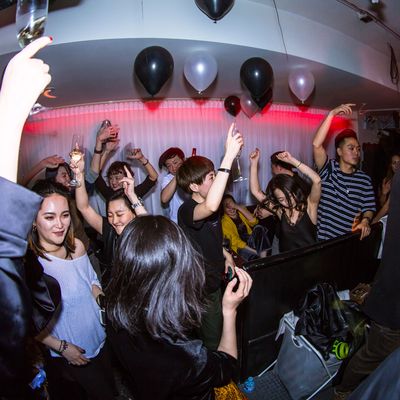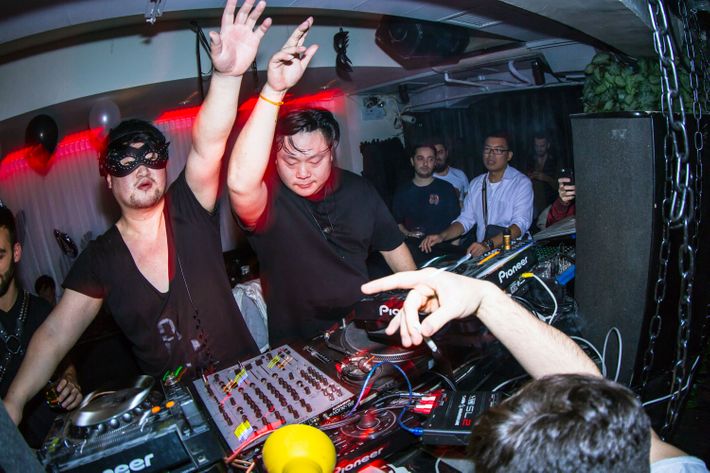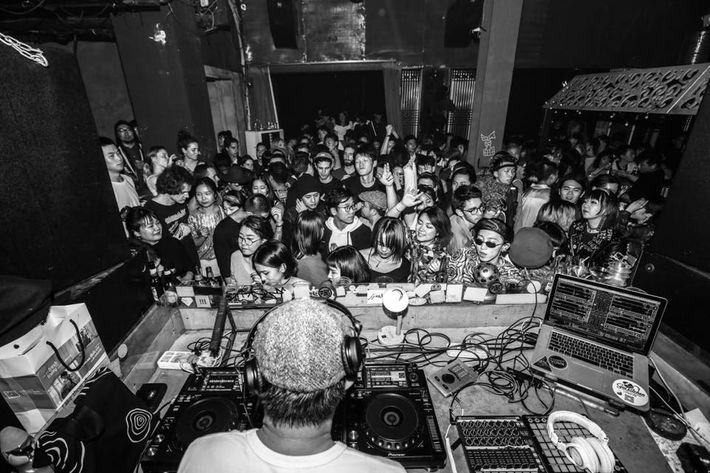
Like most major cities in Asia, and indeed the world, the Chinese capital has nightclubs catering to the bottle-popping party set. Beijing’s are found in Gongti and often attract big-earning DJs and big-spending drinkers. Vics and Mix, both in the Workers’ Stadium complex, are among the most famous. For more interesting music and far cooler clubs, there are alternatives. Lantern is in Gongti but attracts respected touring and local DJs, with none of the seediness of its neighbors. Aurora, a small new club just north of Gongti, represents the friendlier flip side of the area’s club scene. And further west in Gulou, Dada is a sticky-floored Beijing institution and a mecca for the city’s hippest clubbers. Here, DJs from all three clubs make the hard sell for their nighttime homes.
Dada
“I returned to Beijing in the end of 2013 and have been deejaying at Dada ever since; I play disco, funk, afro, house, Italo disco, rare groove, hip-hop, rock … it depends on my audience, my mood, and the atmosphere. Dada gets busy on Wednesdays and Thursdays, and it’s packed by the weekend. Its biggest charm is its diversity, allowing various music styles to flourish. No matter if you’re a hard-boiled DJ addict or a clubbing newbie, Dada gives you an opportunity to show off your stuff. The audience is so varied: Chinese, foreigners, young, old, trendies, rock lovers, office workers. Generally speaking, it’s simply for people who are interested in new things. The interior of Dada is fairly minimal, but with the help of illustrators, the concrete walls have become vivid paint boards covered in graffiti. I’ve spent countless amazing nights here. But the most impressive was when I met Santo Chino, a longtime Shanghai resident. I just love him so much, and was drunk on his music all night, so look out for him.” —Watermelon, resident DJ at Dada

Aurora
“Aurora opened at the end of March 2018. Nights there are big parties for everyone, from white collars to trendies to avant-garde artists. Wednesdays are for hip-hop and bass, Thursdays are Soul Train nights with funk music, and Fridays and Saturdays are for Beijing-based electronic record labels. I normally play tech house, deep house, and nu-disco at Aurora. Besides regular gigs, we have one international avant-garde electronic musician every month, one massive hip-hop gig every month, plus a ‘Natural Flavor’ show held by Beijing rapper Nasty Ray. I think that’s why Aurora is becoming the destination for Beijing’s trendies — we’re confident in our music taste, and confident that this makes us different from the bigger clubs nearby.” —Pancake Lee, founder of Aurora and regular DJ

Lantern
“I’ve been DJ-ing for 21 years and I’m still in love with it. And you can tell my love for traditional Chinese stuff from Lantern’s interiors and the wooden furniture. I attached special sound-processing material to our walls so the feedback is lower, and I changed the light effects to lighten up the place. We start at 10 p.m., and where other clubs are empty by 3 a.m. or 4 a.m., we last until 7 a.m. The clientele is probably half Chinese and half foreigners — in recent years, we’ve seen more young Chinese people coming because they’ve started listening to more electronic music. The techno we play is very different from the kind of EDM played in huge clubs such as Mix. A lot of people say they can’t go back to those big flashy clubs, because the music there is so bad.” —Weng Weng, manager of Lantern and regular DJ